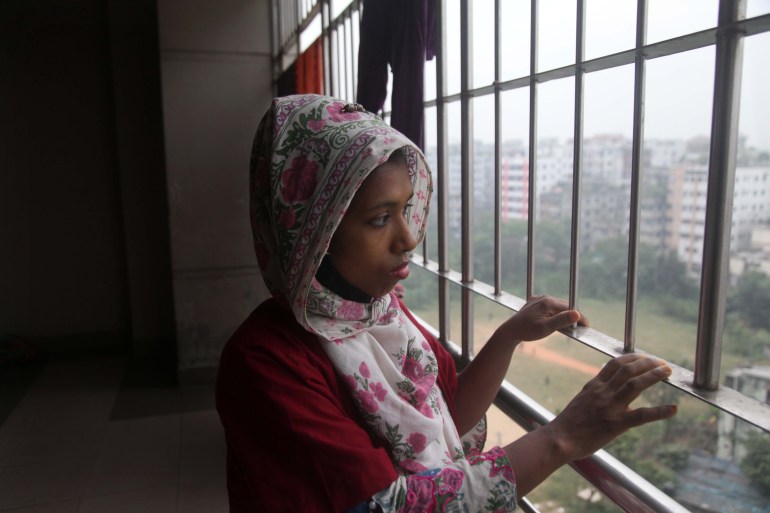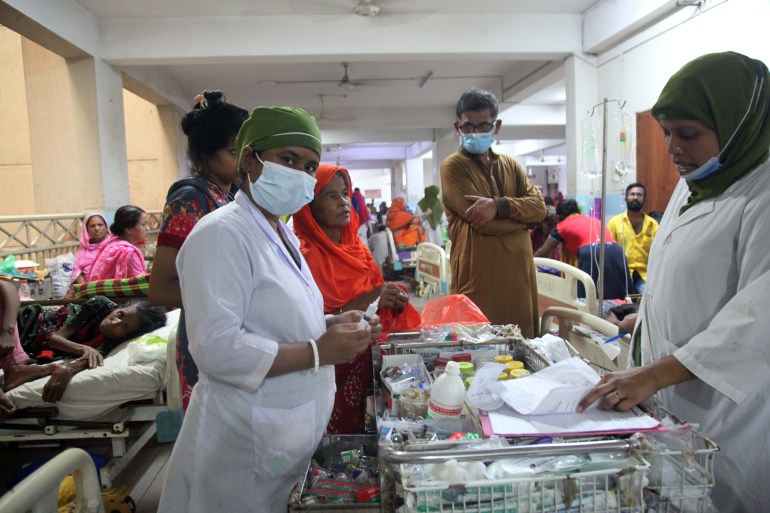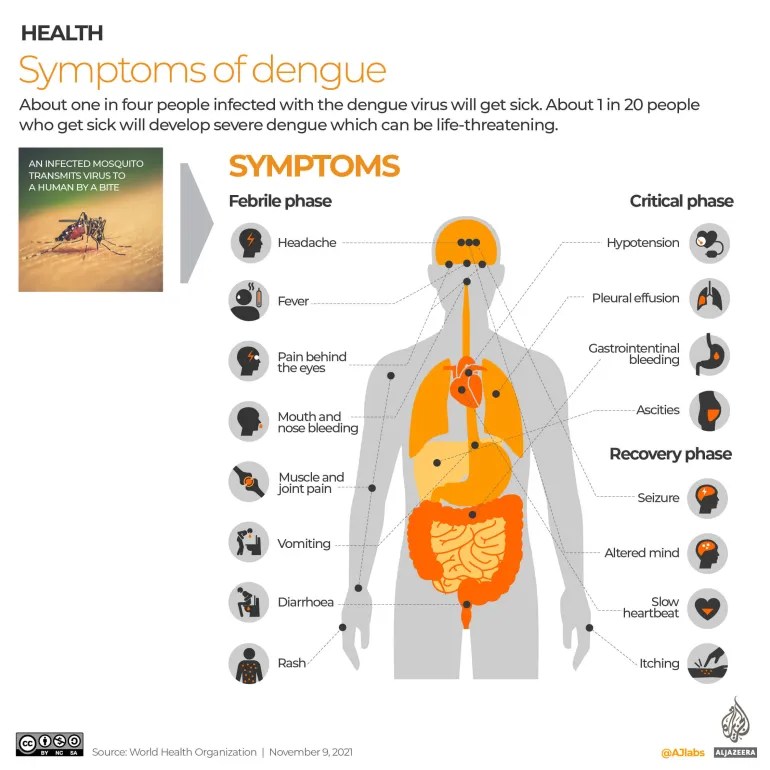Dhaka, Bangladesh – Each time Mosammat Mayna enters the dengue ward at Mugda Hospital in Bangladesh’s capital, sorrow and worry grip her thoughts.
The 23-year-old has been working as a cleaner within the hospital for almost a month, and the one cause she obtained the job was as a result of her sister, Maria Ratna, died of dengue final month whereas doing her obligation as a cleaner in the identical ward.
“My sister worked relentlessly for months during this year’s dengue outbreak and eventually caught the disease. After she died, the hospital authority offered me her job,” Mayna instructed Al Jazeera.
“Our family was devastated by Ratna’s death, but since I was out of work, I took the offer despite being very scared.”

Bangladesh is present process its worst-ever dengue outbreak in historical past, with hospitals packed to the brim and the dying toll rising. Final Wednesday, the nation recorded 24 deaths – the very best in a day – from the mosquito-borne illness.
Whereas the illness doesn’t unfold from individual to individual, a mosquito that bites an contaminated affected person then turns into a service, and may transmit dengue to others it bites. That makes locations with a excessive focus of dengue sufferers — such because the hospital the place Mayna works — extra harmful for many who will not be but contaminated.
Well being specialists are alarmed as dengue often subsides within the South Asian area when the annual monsoon rains cease by the top of September.
As of Monday, not less than 1,549 individuals – together with 156 youngsters, from newborns as much as these aged 15 – have died of the illness in Bangladesh, which has recorded a complete of 301,255 dengue instances this yr, in keeping with the federal government’s Directorate Basic of Well being Service (DGHS).
The document deaths are roughly 5 instances final yr’s tally of 281 fatalities – the very best in a single yr in Bangladesh’s historical past – till the outbreak this yr. The earlier highest variety of instances in a single yr – 1,01,354 – was reported again in 2019.
“I have never witnessed a dengue outbreak of this proportion,” Mugda Hospital’s director Dr Mohammed Niatuzzaman instructed Al Jazeera, including that sufferers have been streaming in from throughout the densely-populated nation. “It’s very unusual to see such a large number of dengue patients in November.”
Outbreak of ‘epidemic’ proportion
Dengue outbreaks earlier have been largely confined to closely populated city centres such because the capital Dhaka, house to greater than 23 million individuals. Specialists say the illness this yr has reached each district, together with the agricultural areas.
The DGHS information says 65 p.c of the instances reported this yr have been from outdoors of Dhaka – the primary time the capital had fewer instances than the remainder of the nation.
Sohaila Begum got here to Mugda Hospital from the southern district of Patuakhali together with her 11-year-old daughter, who has had a excessive fever for greater than per week now. With no beds obtainable, they’re staying within the hospital’s corridors.
“When her fever got worse, doctors at the district hospital told us to immediately take her to any good hospital in the cities,” she instructed Al Jazeera, including that her daughter’s scenario had improved.
“We came to Dhaka but are now running out of money. Everything is so expensive here. We will be in trouble if we stay longer.”

Public well being skilled and former DGHS director Dr ANM Nuruzzaman instructed Al Jazeera this yr’s outbreak is a minimum of an epidemic.
“The problem is the severity of dengue has sort of gone out of the public and media’s radar as the country is going through a political turmoil ahead of the next election,” he mentioned.
Bangladesh is anticipated to carry the overall election on January 7 amid political uncertainty and violence gripping the nation, as the primary opposition Bangladesh Nationalist Social gathering (BNP) is demanding the elimination of the ruling Awami League authorities and the set up of a caretaker administration to make sure free and honest polls.
“Dengue is a serious crisis as the pattern and severity of the disease have changed and turned to worse. The government should have declared it a public emergency long ago,” mentioned Nuruzzaman.
Authorities officers declare that they’ve accomplished every thing to examine dengue’s unfold and that declaring it a public emergency or epidemic wouldn’t have made a lot distinction.
“All the government hospitals across the country were instructed to open special dengue wards in the beginning of August. The health ministry also allocated an emergency budget to fight the outbreak,” Dr Mohammad Robed Amin, director of noncommunicable illness at DGHS, instructed Al Jazeera.
“The problem is our country’s healthcare system has serious limitations because we are a large population and it’s almost impossible to ensure healthcare and treatment for all,” he mentioned.

Amin famous that instances and deaths this yr are “abnormally high” for a number of causes. “The first and foremost reason is the overwhelming prevalence of Den-2 type strain of dengue among the patients,” he mentioned.
Dengue has 4 sorts: Den-1, Den-2, Den-3 and Den-4. An individual turns into proof against a dengue sort after an infection, however to not different sorts.
“For the last couple of years, Bangladesh mostly had Den-3 type strains and people had developed immunity against it. But this year, over 75 percent of patients were diagnosed with Den-2 and almost all the patients who died were affected by this particular strain,” mentioned Amin, including that a number of research have discovered that Den-2 outbreak is worse when it’s adopted by years of Den-3 prevalence.

One more reason behind the excessive fatalities is the outbreak in rural areas, he mentioned.
“This year, the disease has spread across the country, and in rural areas, the health facilities are very scarce. Besides, most people are not aware of the severity of the illness. If you don’t get treatment on time, it can get fatal. And that has happened in many areas.”
What brought about the document deaths
In the meantime, entomologists say they might have discovered the doable cause behind this yr’s document outbreak.
Kabirul Bashar, professor of medical entomology at Bangladesh’s Jahangirnagar College, instructed Al Jazeera that the sample of dengue subsiding by September modified final yr when the illness reached its peak in October and brought about 86 deaths. A yr earlier than that in 2021, that quantity was 22.
“We rang an alarm last year, saying the very pattern of the disease has changed. Now dengue is not a disease associated with monsoon anymore, it’s a year-long thing,” mentioned Bashar, who can also be the lone scientific skilled on the nation’s Nationwide Anti-Dengue Committee.
The scientist mentioned local weather change is altering patterns in temperature, rainfall and different pure phenomenon.
“Now, we see almost monsoon-like consistent rain throughout October and early November. It changes the breeding and lifecycle of the Aedes mosquito populations,” he mentioned, referring to the kind of mosquito that carries dengue.

Dengue is generally prevalent in South and Southeast Asia between June and September, when stagnant water offers the perfect habitat for the Aedes mosquito, which often breeds in clear water and feeds throughout the day.
However in a groundbreaking discovering, Bashar, who has been learning mosquitoes for greater than 20 years, found that the mosquitos now breed even in soiled sewers and in saline seawater.
“So, on the one hand, you have unusually consistent rains during the off-season that provide an ideal ground for their breeding and, on the other hand, you have the mosquitoes broadening their horizon for reproduction. It’s a double whammy,” he instructed Al Jazeera.
Entomologists additionally found that the 2 most generally used pesticides, malathion and temephos, had turn out to be “useless” in opposition to Aedes mosquitoes in Bangladesh.
“These two insecticides have turned sub-insecticide, losing their efficacy against mosquitoes because they have developed resistance,” mentioned Md Golam Sharower, professor on the Nationwide Institute of Preventive and Social Drugs.
“Unfortunately, most of our city corporations across the country still use these two insecticides, which help very little in controlling the mosquito population.”
Bashar mentioned the federal government must take a full-fledged five-year plan to manage the unfold of dengue and finally eradicate the Aedes mosquito inhabitants.
“The disease will only get worse in the upcoming years if such a plan is not activated immediately,” he mentioned.
Again at Dhaka’s Mugda Hospital, Mayna, overwhelmed by the unusually lengthy dengue epidemic, has begun to rue her choice to work as a cleaner.
“I thought dengue would subside with the end of the rainy season, but patients keep coming in every day. Forget the ward beds, there is no space even in the hospital corridors,” she instructed Al Jazeera.
“I fear I might also end up like my sister.”

